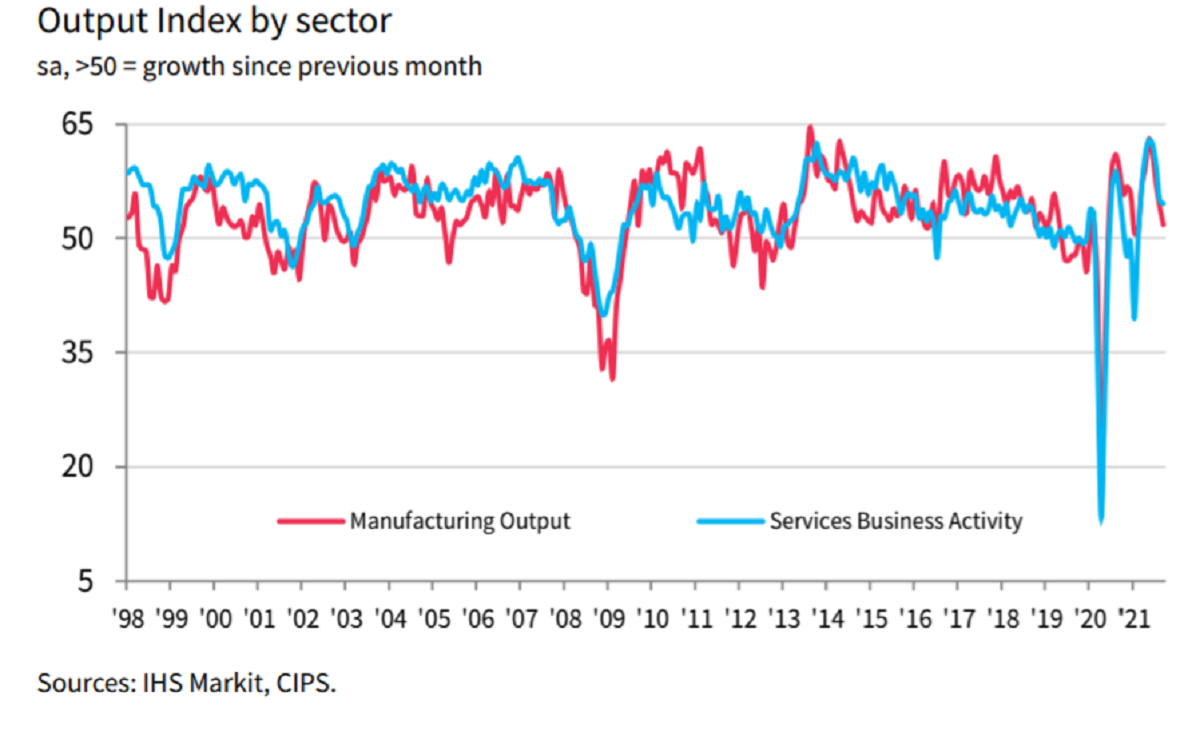UK economy slows in September amid rising inflation

The UK economy lost more momentum in September, as inflationary pressures climbed to a record high and forced costs to rise.
According to data from IHS Markit, private sector growth fell to a seven month low, missing expectations, while manufacturing also missed estimates due to supply bottlenecks.
Its Purchasing Managers Index (PMI), which factors in both the services and manufacturing sectors, fell from 54.8 points in August, to 54.1 points last month. It was the fourth consecutive drop and the lowest reading since February.
Economists had expected a reading of 54.5 — above the 50 point mark separating growth from contraction.

The PMI for the services sector fell to 54.6 in September from 55.0 in August, and the PMI for the manufacturing sector fell to 56.3 from 60.3. Both readings were the lowest level since February when Britain was still in lockdown.
As rising inflation caused increased costs, last month companies raised their own selling prices at the strongest pace since records began in the mid 1990s, the survey found.
Declines in the food and drink and car manufacturing sectors were largely caused by a lack of staff and material, IHS Markit said, with the shortages driving up prices at “unprecedented rates.”
Watch: What is inflation and why is it important?
Brexit was cited as having exacerbated global pandemic-related supply and labour market constraints, as well as being blamed on lost export sales.
Due to this, business confidence was at its lowest level since January, but remained above the series average as companies expressed optimism around the 12-month outlook.
Firms continued to expand their staffing levels at a rapid pace, particularly in the service sector where the rate of job creation was only slightly weaker than August's record. Employment growth slowed sharply at manufacturers amid shortages of available staff and moderating demand.
Read more: UK service sector growth slows amid staff shortages and supply chain disruption
“The September PMI data will add to worries that the UK economy is heading towards a bout of ‘stagflation’, with growth continuing to trend lower while prices surge ever higher,” Chris Willison, chief business economist at IHS Markit, said.
“While there are clear signs that demand is cooling since peaking in the second quarter, the survey also points to business activity being increasingly constrained by shortages of materials and labour, most notably in the manufacturing sector but also in some services firms.”
Rhys Herbert, senior economist at Lloyds Bank, said: “Another slip in growth reflects persistent supply chain constraints mixed with the reality that the economy is starting to hit a ceiling as it edges back to its pre-pandemic state.”
Watch: Staff shortages and supply disruption threaten to derail recovery - BCC


